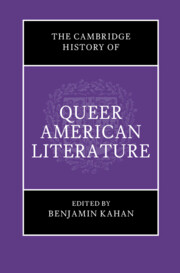Book contents
- The Cambridge History of Queer American Literature
- The Cambridge History of Queer American Literature
- Copyright page
- Contents
- Figures
- Tables
- Contributors
- Acknowledgments
- Introduction
- Part I Synchronic Histories of American Sexuality
- The Sexuality of American History
- Queer Literary Movements
- 9 Trans-ing Transcendentalism
- 10 Sentimental Literature and the Erotics of Identification
- 11 Queer Modernism and Misfit Identity
- 12 Imperialism and the Queer Harlem Renaissance
- 13 The Mystical Sexuality of the Beats and the Berkeley Renaissance
- 14 The New York School’s Queer Happiness
- 15 Chicana and Latina Lesbian Feminists and the Radical Making of Anthological Archives of Willfulness
- 16 Queer Literature after Queer Theory
- Part II Diachronic Histories of American Sexuality
- Part III Queer Methods
- Index
12 - Imperialism and the Queer Harlem Renaissance
from Queer Literary Movements
Published online by Cambridge University Press: 17 May 2024
- The Cambridge History of Queer American Literature
- The Cambridge History of Queer American Literature
- Copyright page
- Contents
- Figures
- Tables
- Contributors
- Acknowledgments
- Introduction
- Part I Synchronic Histories of American Sexuality
- The Sexuality of American History
- Queer Literary Movements
- 9 Trans-ing Transcendentalism
- 10 Sentimental Literature and the Erotics of Identification
- 11 Queer Modernism and Misfit Identity
- 12 Imperialism and the Queer Harlem Renaissance
- 13 The Mystical Sexuality of the Beats and the Berkeley Renaissance
- 14 The New York School’s Queer Happiness
- 15 Chicana and Latina Lesbian Feminists and the Radical Making of Anthological Archives of Willfulness
- 16 Queer Literature after Queer Theory
- Part II Diachronic Histories of American Sexuality
- Part III Queer Methods
- Index
Summary
Ngô explores the variegated roles that imperialism played as a tool to inspire forms of Black politics. Imperialism helped to define a method for how the queer writers of New York challenged the construction of identity categories that shaped the social order. Through a study of orientalist objects, characters, and the shaping of a queer black politics, Ngô examines touchstone works by the eras most important writers, including Langston Hughes, Wallace Thurman, Nella Larsen, Richard Bruce Nugent, Jean Toomer, and Claude McKay, the essay uncovers a range of methods and politics behind queer black creative arts. While some authors used imperial logic to create a queer Black aesthetic and expose the meanings assigned to race, gender difference, and nonnormative sexualities, others were inspired by anitcolonial movements to push back on the state, challenging law, policing, and incarceration.
- Type
- Chapter
- Information
- The Cambridge History of Queer American Literature , pp. 225 - 238Publisher: Cambridge University PressPrint publication year: 2024

